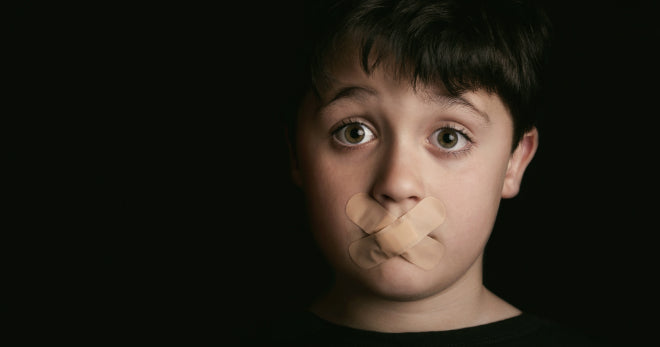" What should I do? "
The two children have just been playing happily together and suddenly the little boy screams out loud. His playmate has bitten him. Big tears roll down his face and he seeks comfort from his mom. The other boy, on the other hand, doesn't understand what he has done and it is not uncommon for parents of affected children to feel quite helpless in such a situation. It is therefore helpful to take a closer look at this topic. Especially if it appears that it was not an accident or a slip of the tongue. So what should parents do if they find out? My child is biting me or others!
The biting phase
There is nothing unusual about a child biting. It is an expression of anger, disappointment or frustration. While other toddlers are more inclined to pinch or hit, others give themselves air by baring their teeth.

Biting in toddlers is associated with various emotions
The so-called biting phase usually occurs between the first and third year of life. This is a time when a child becomes aware of its environment and begins to see itself as part of this big world. It wants to communicate. However, children at this age often do not speak at all or only insufficiently to express everything that really moves and concerns them.
In practice
- A simple example shows how these situations can arise:
The little ones are just having a wonderful time playing together and the little boy is convinced that the little toy car in his hands belongs to him. But the next moment, his playmate unexpectedly takes it away from him and the little boy is unable to say in words that he doesn't like it. The child bites.

Toddlers play together and often bite in the event of a dispute
- Another situation illustrates the other reasons why a child bites:
"In the store, the little girl really wants the cute pearl necklace. Her mother denies her this wish. Suddenly, the daughter simply bites her hand."

Biting parents out of aggression or disappointment
In both situations, the child is unable to express their feelings with words. It is a kind of helplessness that unfortunately manifests itself in this form. Young children first have to learn that disappointments are part of life and that boundaries have to be set.
As parents, you need to deal with this as calmly but consistently as possible. The following tips should help you to find a few ways out of these situations:
-
When your offspring hurts other children
Of course, your little sunshine will grow up in a protected and loving environment and, above all, without violence. So it's all the worse when your little one hurts others.

A typical fight between toddlers: Who gets to go on the swing first?
First take care of the boy or girl concerned. Briefly offer comfort and then turn your attention to your child. Make it clear that it is not good if it bites and that you must not hurt anyone. Show how sad the other boy or girl is now. Speak quietly but sternly.
-
If the little ones bite you when you are carrying them in your arms
It often happens unexpectedly to mom or dad. Especially when a baby bites. It usually comes as a surprise and many parents react purely out of reflex. Put the baby down gently and feel free to say "ouch" out loud. It understands that it has done something that is causing you pain.
-
If the attacks occur constantly
Toddlers sometimes use these attacks to get attention or simply to get their way. Therefore, never allow your little princess or prince to achieve anything. Whether in a negative or positive form. As soon as small children realize that they can use it to achieve something, they will use it manipulatively. Remain consistent and show concern or punish them with temporary ignorance.

Scolding is not always the best tactic, sometimes ignoring the little ones is more effective
Language as the key to communication
Many parents find that this misbehavior quickly disappears once they have acquired a larger vocabulary. Children are now able to communicate and articulate themselves much better through the language they have learned. Even if the vocabulary is still far from complete. Nevertheless, it is now much easier to react appropriately in more difficult situations.
Support in learning the language is therefore incredibly important. Pay a lot of attention and clearly show how good it is when the first words are spoken correctly.
Violence begets counter-violence - a lot of calm and patience are required
Even if it is difficult in one situation or another. Keep as calm as possible and swallow your resentment. If you get loud or even let your hand slip, you will ultimately only achieve the opposite.

Calm and patience are the order of the day! Shouting and swearing in the long term only generates counter-violence
It has always been known that violence begets counter-violence. This does not always involve physical violence. Shouting or even yelling also conveys a kind of violence that brings negative experiences for the little ones. At this point, remember that there is positive attention as well as negative attention. In other words, children unfortunately also succeed in attracting their parents' attention through naughty behavior and thus want to get their way in a certain way.
My child is biting me! Quick help in dicey moments:
- Take your child to one side and defuse the direct confrontation.
- If necessary, first ensure a brief physical separation.
- Make it clear that you are hurt or that someone else is in pain.
- Say that it is not good.
With small rewards to big goals
The so-called biting phase often goes hand in hand with the dreaded defiant phase. The transition from baby to toddler is another challenge for parents when an angel turns into a brat or a sunshine turns into a little thunderstorm.


It is always important that positive behavior and, above all, improvements on your part are rewarded. We're not talking about lavish gifts or big outings here. Rather, it's about giving recognition.
A nice idea is a small suitcase. Such a small children's suitcase can now be filled with small gifts or homemade items be filled. In this way, you can show children a positive reaction to their improved behavior.
Why not make a pretty necklace out of beads or a small bracelet together? The peace and quiet and the time spent together are a great reward. Gradually fill the little suitcase with little treasures.


This is not quite feasible with a baby. If there are still problems with biting, then take a special teething ring to hand. A baby usually bites when new teeth are breaking through. This is a little different to a toddler. This is because a baby is not yet really trying to get its head around this.
When should a doctor be consulted?
If you feel overwhelmed or if the phase seems to be getting out of hand, please consult a pediatrician. You are not alone with this problem. A doctor will be able to find out whether there are other reasons for the behavior and how you can be helped.










